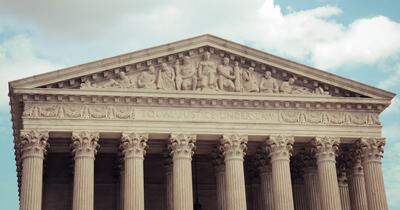
Shelby County v. Holder at 10—We’re Fighting for an Inclusive Democracy
We must restore the Voting Rights Act and expand opportunities for participation in our democracy.

On the 10th anniversary of Shelby County v. Holder, we reflect on the damage that's been done, our efforts to fight back, and the transformative strategies we need to achieve a truly just, inclusive democracy.
The Voting Rights Act of 1965 was a landmark piece of legislation that fought to fulfill the promise of the 15th Amendment, that no citizen could be denied the right to vote based on race.
The Voting Rights Act of 1965 was a landmark piece of legislation that fought to fulfill the promise of the 15th Amendment that no citizen could be denied the right to vote based on race. The legislation was highly effective, eliminating poll taxes and other discriminatory practices that prevented Black and brown people from voting. The VRA's effectiveness hinged on Section 5, which outlined a "preclearance" system that required jurisdictions with a history of racially discriminatory voting practices to gain approval for any changes to their voting procedures from the federal government.
That ended in 2013 when the conservative Supreme Court removed a strong enforcement mechanism within the Voting Rights Act. In a decision by Chief Justice John Roberts, the Court declared that the coverage formula in Section 4 identifying which jurisdictions were subject to the preclearance was outdated. This effectively rendered Section 5 moot and allowed jurisdictions to implement racially discriminatory voting practices that otherwise would have been stopped by the federal government. In the immediate aftermath, Texas announced it would be moving forward with a discriminatory voter I.D. law that the courts had previously blocked. Other states previously required to submit for preclearance would subsequently follow with deeply restrictive changes to voting. Two months after Shelby County, North Carolina passed HB 589, a bill designed to systemically disenfranchise Black voters, imposing a voter I.D. law, reducing early voting, eliminating out-of-precinct voting, and ending pre-registration for 16- and 17-year-olds.
Post Shelby County, right-wing institutions have vigorously – and more easily – attacked Black and brown people’s right to vote.
Post Shelby County, right-wing institutions have vigorously – and more easily – attacked Black and brown people's right to vote. The Leadership Conference Education Fund found that between 2012-2018, 1,688 polling locations, which predominantly served communities of color, closed in jurisdictions previously covered by Section 5. Meanwhile, the Brennan Center estimates that voter purge rates in jurisdictions previously subject to preclearance were 40% higher than in jurisdictions that were not. In addition, the courts have continued to strip away Black and brown people's voting rights. Though the Supreme Court recently upheld Section 2 of the VRA, this is a rare preservation of the status quo compared to the havoc they've wreaked in the past 10 years, including weakening Section 2 and using the shadow docket to make it harder for Black and brown people to vote in the 2020 election.
In the face of such emboldened opposition, we need dynamic solutions that not only undo the damage of Shelby County but protect and expand our democracy to serve us all.
After the 2020 election and the false claims of widespread voter fraud and a stolen election, voters in several states were subjected to hyperpartisan legislation further restricting ballot access. In the face of such emboldened opposition, we need dynamic solutions that not only undo the damage of Shelby County but protect and expand our democracy to serve us all. Congress must pass comprehensive pro-democracy legislation like the Freedom to Vote Act and the John R. Lewis Voting Rights Advancement Act. These bills will restore the Voting Rights Act and create new national standards for early and absentee voting, automatic and same-day voter registration, rights restoration for returning citizens, and standards for voter identification.
While passing legislation is a pivotal step to building a multiracial democracy, it's only the beginning of what we must accomplish. Neither of these bills guarantees a democracy where all members can participate in the political process.
As two of my Dēmos colleagues wrote previously:
Creating an inclusive democracy requires thinking beyond the formal political rules of voting and elections to the very institutions of governance and participation themselves, which too often serve to keep people from meaningful democratic engagement and control. It demands creating cultures that promote structures that facilitate co-governance between elected officials and the communities they represent, including direct lines of communication, two-way accountability, and the guarantee that unaccountable lawmakers or unelected decision-makers will not subvert the will of the people. And it demands creative thinking about how to democratize other areas of our lives, from the workplace and the environment to the goods and resources we consume on a daily basis.
Over the past several years, Demos has worked with our Inclusive Democracy Project partners to develop the Inclusive Democracy Agenda: a transformative policy agenda that advances solutions prioritized by and for communities of color on the frontlines of combatting racial injustice and oppression nationwide. As we followed the leadership of our grassroots partners, it became clear that folks on the ground were calling for more than the status quo. They called for a Constitutional Right to Vote, with universal voter registration and enfranchisement for all, independent of involvement with the criminal (in)justice system. Statehood for D.C. and self-determination for Puerto Rico and other U.S. territories. A small donor democracy that kept big money out of politics and an energy democracy owned and run by the people, not corporations.
While many of these policy goals might seem lofty, they are the solutions we need to address our democratic crisis head-on. For too long, Black and brown people have been kept out of the promise of our democracy. If we are serious about building a just, multiracial democracy, we must restore the VRA and expand opportunities for participation in our democracy.

![People marching on Washington with protest signs [Main IDA image]](/sites/default/files/styles/514x349/public/2020-12/IDA_Banners_main.png?h=6f661e4e&itok=D2Aajk7s)
